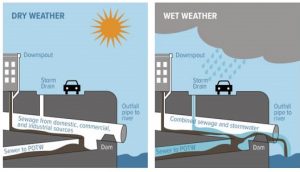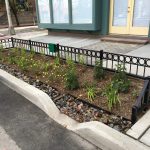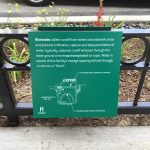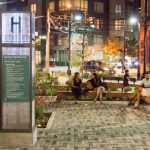NJ Water Bank Offering Principal Forgiveness for CSO Abatement

In response to the Clean Water Act, the National Combined Sewer Overflow (CSO) Policy, and the New Jersey Pollutant Discharge Elimination System (NJPDES) Regulations, the NJ Department of Environmental Protection (NJDEP) issued 25 individual NJPDES permits to require the submission of a Long-Term Control Plan (LTCP) to reduce or eliminate CSOs. These permits were issued to the permittee who owns/operates the Combined Sewer System (CSS) as well as the permittee who owns/operates the receiving wastewater treatment plant. These permits affect the 21 municipalities in New Jersey with CSO outfalls. The permit requirements stress the development of regional strategies to reduce the amount of storm water that flows into CSSs through the development and implementation of an LTCP and requires the municipality and sewage treatment plant to work cooperatively. Public participation and engagement are also requirements of the permit throughout the LTPC process.
As community leaders become aware of additional available funding sources, such as the NJ Water Bank, (Water Bank) a financing program run jointly by the NJDEP and the NJ I-Bank, they can overcome some of the obstacles that have been impeding critical infrastructure repair. The NJ Water Bank is a vanguard lending institution in the State, helping communities take advantage of available funds with low-interest rate loans and principal forgiveness loans. The Water Bank is a joint low-rate funding program of the NJDEP and the New Jersey Infrastructure Bank (I-Bank) to finance eligible environmental infrastructure expenses. The Water Bank finances water infrastructure projects by utilizing two funding sources. The NJDEP administers a combination of Federal State Revolving Fund (SRF) capital grants, as well as the State’s matching funds and State appropriations. The I-Bank borrows funds through the issuance of municipal bonds. The partnership between the NJDEP and the I-Bank has created the ability to provide the lowest cost funding for water infrastructure projects in New Jersey. Since its inception in 1986, the program has saved New Jersey’s taxpayers and ratepayers more than $2.3 billion through lower interest costs and provided over 130,000 direct construction jobs.
The Water Bank has incentivized CSO communities with a dedicated $25 million designated in Principal Forgiveness Loans in the SFY2021 for CSO Abatement projects utilizing gray and green infrastructure. Many CSO communities have used Water Bank funding to implement high profile projects that take advantage of principal forgiveness offerings to greatly reduce stormwater flow while simultaneously saving their ratepayers in the long term.
Two such examples are the Southwest and Northwest Parks in the City of Hoboken. Hoboken’s CSS collects both sanitary and stormwater flows, diminishing water quality and leading to flooding. The innovative use of green infrastructure in the two parks detain up to 1.2 million gallons of stormwater runoff and slowly release it to the City’s sewer system for treatment, reducing the frequency and volume of diluted raw sewage discharged into nearby waterways, or backup of such into neighborhoods and basements. The combined water retention provides public health, environmental and quality of life benefits to the City. In addition, the larger-scale Northwest Resiliency Park project proposes the separation of the CSS in parts of the City, further reducing combined sewer overflows and local flooding.
The Southwest Park is a one-acre plot that was designed to capture 200,000 gallons of stormwater runoff while providing green space for the neighborhood. Southwest Park serves as a small-scale model for integrating green infrastructure and underground retention to reduce flooding. The stormwater design combines passive rainwater collection with permeable pavement rain gardens and bioswales with subsurface storage beneath the park. All of the pavement within the park is permeable so that the first rainfall is absorbed within the pavement. Subterranean storage chambers located in the zone between the park pavement and the water table collect overflow from the rain garden and any drain inlets within the park. The stored rainwater is then slowly released to reduce the peak flow to the City’s sewer system and keep the CSS from overflowing.
The Southwest Park project was funded with approximately $5.1 million in loans from the NJ Water Bank. Because this project addressed CSO issues with green infrastructure, this project qualified for $1 Million in principal forgiveness. Total savings for this project including interest cost savings are estimated to be $2 Million over the 20-year term of the loan or 40% of the total project cost. In addition, this project created an estimated 61 direct construction jobs.
The land for the Northwest Park was acquired with funding from the Water Bank and the total eligible project costs are estimated to equal $37 million. These parks represent leading examples of what innovative design and green infrastructure can accomplish for a community by integrating plans that conserve water, improve public health, reduce stormwater and flooding, and provide open space for public enjoyment and better quality of life.
Additional CSS communities have been able to take advantage of Water Bank Funding for less high-profile projects that are still beneficial to their communities. Jersey City, for example, had a flooding problem affecting two locations: one at Public School (PS) No. 5 and the other its Municipal Utilities Authority Administration Building. The students at PS No. 5 in Jersey City prompted the initiation of this project. The area in front of the school flooded regularly and often impeded the students from arriving at school. This prompted a discussion with their Science teacher, Mr. Albert Padilla, about how they could resolve the issue. Mr. Padilla read up on green infrastructure and reached out to the Rutgers CoopX (CoopX) who sent representatives to do an evaluation at the school. In the meantime, the students calculated rainfall and analyzed how much green infrastructure would be needed to solve the flooding issues at their school. The CoopX representative validated the data compiled by the students which gave them the confidence to continue the project more seriously. They pitched their plans to the City Council and 1 ½ years later, the project was initiated by the Jersey City Municipal Utilities Authority (JCMUA). The students learned a great deal about water, how to conserve it and how to contain it. According to Mr. Padilla, “The students wanted to create an example of urban sustainability and eventually reshape urban landscapes. They also learned that they have a voice and the ability to create change, all valuable lessons indeed.”
The green infrastructure portion of the project included the replacement of deteriorating sidewalk with pervious sidewalks to recharge groundwater. Two existing downspouts were directed into six pre-cast downspout planter boxes equipped with perforated underdrains that discharge to approximately 1,760 square feet of pervious concrete sidewalk that intercept, treat and filter stormwater runoff from the rooftop. Approximately 8,540 square feet of porous asphalt parking spaces were installed to intercept, treat and filter stormwater runoff from the parking lot. Two rain gardens were installed in front of the JCMUA building to capture stormwater runoff from the adjacent parking lot. Three rain gardens were installed along NJ Route 440 to intercept, treat and filter stormwater runoff from part of the roadway.
The JCMUA completed these stormwater improvements with approximately $6.6 million in loans from the NJ Water Bank. The project qualified for principal forgiveness totaling $1.3 million as it addressed damage from Superstorm Sandy and improved resilience for future storms. Another component of the project addressed CSO issues with green infrastructure, qualifying for additional principal forgiveness funds. Including interest cost savings, total savings for this project is estimated to be $3.4 million, over the 20-year term of the loan or 51% of the total project cost. In addition, this project created an estimated 79 direct construction jobs.
The City of Paterson is also served by a CSS which conveys sanitary sewage, industrial wastewater and stormwater through the same conduit. The City constructed control facilities to eliminate and properly dispose of solids and floatables greater than half an-inch. Static bar screens and in-line netting chambers were constructed on a total of ten sites at various points along the Passaic River with internal modifications to the regulators blocking flow. The project was funded with approximately $2 million in loans from the NJ Water Bank. This project qualified for principal forgiveness totaling $1 million as it enhanced water quality under the American Recovery and Reinvestment Act (ARRA). Including interest cost savings, total savings for this project is estimated to be $1.7 million over the 20-year term of the loan or a whopping 80% of the total project cost. In addition, this project created an estimated 240 direct construction jobs.
CSS communities in New Jersey are encouraged to include green infrastructure projects in their long-term control plans because they contribute to CSO control while providing multiple environmental, social, and economic benefits. In addition to alleviating flooding issues, green infrastructure can improve water and air quality, reduce energy use and urban heat island effects, create green jobs and improve quality of life. Larger scale green infrastructure strategies can also increase recreational opportunities, improve wildlife habitat and biodiversity, and help mitigate flooding. There are also economic benefits as redevelopment opportunities become more promising when infrastructure can handle the population intended to use it. The effective use of green infrastructure supports sustainability as it conserves water while providing green space for neighborhoods and reducing health risks. The NJ Water Bank can provide low-cost financing to assist in the implementation of these important projects. For information on financing through the NJ Water Bank to implement long-term control CSO plans, call (609) 219-8600 or visit the website at www.njib.gov.
For more information regarding borrowing through the NJ Water Bank, visit www.njib.gov






